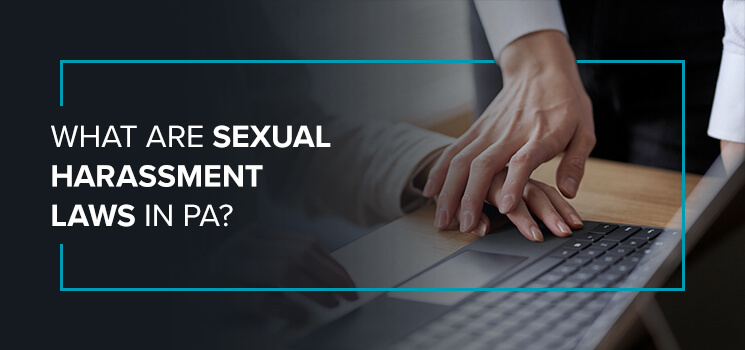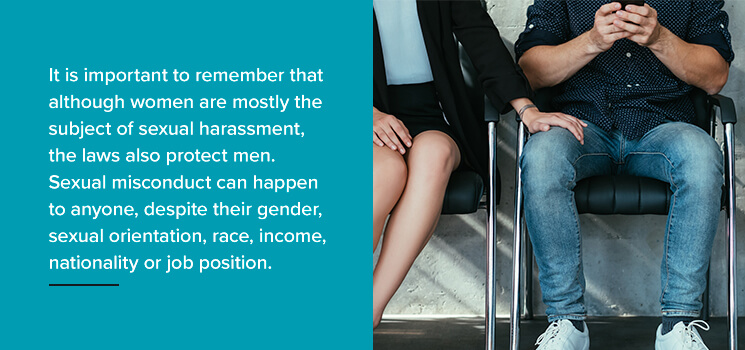Working in an environment that is free from unwelcome sexual harassment is a right, not a privilege. Your workplace has an obligation to protect you as a person and maintain a healthy environment that facilitates respect, productivity and freedom from fear and intimidation on the basis of your gender.
Every 98 seconds, an American experiences sexual assault. In terms of gender, 81% of women and 20% of men experience workplace sexual harassment. It’s important to educate workers on their rights and access to the justice system in order to empower individuals who face such challenges while highlighting the available legal options.
Let’s consider the meaning and scope of sexual harassment, the sexual harassment laws in PA and the avenues to access a remedy.
What Is Sexual Harassment?
The Equal Employment Opportunity Commission (EEOC) defines sexual harassment as unwanted or unwelcome sexual demands or sexual favors. It is considered gender-based workplace discrimination.
The definition is deliberately broad to capture a wide range of sexual conduct, including:
- Sexual assault
- Stalking
- Sexual and inappropriate physical touching
- Demanding sexual favors in exchange for promises
- Inappropriate remarks about a person’s body
- Sending inappropriate and sexual messages such as e-mails and text messages
- Sexually inappropriate jokes
Quid Pro Quo Sexual Harassment
Quid pro quo is a Latin term meaning “this for that”. This form of sexual harassment occurs when sexual demands are attached to job benefits. The act often occurs within the context of power and control. The person responsible for the sexual misconduct is usually in a position of influence. One example could be if a supervisor asks for sexual favors in exchange for a promotion, and then takes adverse action if the advance is rejected.
Hostile Environment Sexual Harassment
Hostile sexual harassment occurs when the workplace is hostile due to unhealthy sexual occurrences. This constitutes a range of situations, including comments and jokes, unwanted sexual touching, sexual assault, and sexually charged photographs and videos. The court in Harris v Forklift Systems stated that an environment is abusive and offensive when the conduct is so severe or pervasive that it would affect the workplace for a reasonable person.
It must be established that:
- You suffered discrimination in the nature of sex
- The discrimination was intentional
- The discrimination was severe or pervasive
- The discrimination affected you adversely
- The discrimination will reasonably affect a person in that same position
- There is a legal basis for the employer’s liability
Sexual harassment in the workplace could be a single instance or a series of events. Regardless of the circumstance, you have the right to work without concern. Remember that if it is against your will and meets the other factors outlined above, it is against the law.
Who Can Be Liable for a Sexual Harassment Claim at Work?
Generally, when the act occurs within or around the workplace or in connection with the job, the person responsible may be liable. sexual harassment extends to acts done by:
- An employer
- A supervisor
- A co-worker
- A client, contractor, vendor or third party
Your employer or the company must ensure that the workplace is free from sexual harassment. When the employer is aware or should have been aware and fails to take the necessary actions or put measures in place to prevent the occurrence, they may be liable.
Do Sexual Harassment Laws Protect Both Women and Men?
It is important to remember that although women are mostly the subject of sexual harassment, the laws also protect men. Sexual misconduct can happen to anyone, despite their gender, sexual orientation, race, income, nationality or job position.
What Are the Sexual Harassment Laws in PA?
Two kinds of statutes protect against sexual harassment in the United States: federal laws and state laws. While some rules directly apply to workplace sexual harassment cases, other ancillary laws protect against sexual harassment situations in Pennsylvania. These include:
- Title VII of the Civil Rights Act of 1964: Prohibits most forms of workplace discrimination, whether based on race, gender, nationality, religion or color. It also requires employers to investigate complaints and take the necessary actions. In 2020, the Supreme Court ruled that the law extends to sexual orientation and transgender status.
- The Pennsylvania Human Relations Act of 1955: Prohibits certain discriminatory practices on the grounds of race, religion, age, national origin, disability, family status and ancestry. The law creates the Pennsylvania Human Relations Commission (PHRC), which also receives and investigates sexual harassment complaints within and outside the workplace.
- The Crime Victims’ Rights Act: Protects persons who face sexual harassment challenges in federal criminal cases. The law guarantees the right to reasonable protection and the right to being heard.
- Chapter 62A of Title 42 of the Pennsylvania Consolidated Statutes: Offers people who face sexual harassment a civil relief requiring the culprit to be distant.
Other relevant laws are Section 3104 of Title 18 of the Pennsylvania Consolidated Statutes, Act 29 of 2019 and Title IX of the Education Amendments of 1972.
What Do You Do When Sexually Harassed?
There are several avenues available to people who encounter sexual harassment. For all these options, securing an employment attorney is a helpful step. Employment attorneys have the experience and expertise to assist you and assess whether you have a claim, file the necessary documents, negotiate a settlement if necessary and represent you if you appear before a court or panel to voice your complaints.
Option 1: Report the Incident to Your Employer
The first avenue is to confirm the employment policy and report the misconduct. Employers are required to ensure that the workplace is conducive for work. Employers do this by setting out rules and guidelines to address complaints. The employer may sanction the person responsible or assist you in filing a complaint.
Option 2: File a Complaint With Government Institutions
The second avenue is to contact state or federal institutions for assistance. The institutions available include the EEOC and the PHRC. File the complaint early to stay within the applicable time restrictions. Generally, you have 300 days to file a complaint with the EEOC and 180 days to file with the PHRC. Note that it is wrong for your employer or any person in authority to retaliate against you for filing a complaint.
Option 3: Take Civil Action in Court
The third avenue is to institute a civil action in court for a remedy. The court gives relief depending on the nature of the claim. For instance, the court may award damages to compensate for losses or require the employer to restore an individual to their former position if they were fired for refusing sexual demands.
Get a Free Consultation at Weisberg Cummings
Sexual harassment laws in PA protect employees against unwanted sexual touching, remarks or any sexually motivated conduct. The law is broadly defined to protect you from employers, co-workers and third parties connected to the employer.
If you feel you have been harassed, you have options. You can report the incident to your superiors or file a claim with the EEOC or PHRC. After you have followed the proper procedures by filing in the EEOC and/or PHRC, you may sue your employer and/or the person responsible for the misconduct. Working with an employment attorney to guide you through the process is essential.
Our employment attorneys at Weisberg Cummings have the experience to assess if you have a sexual harassment claim. Request a free consultation today.



